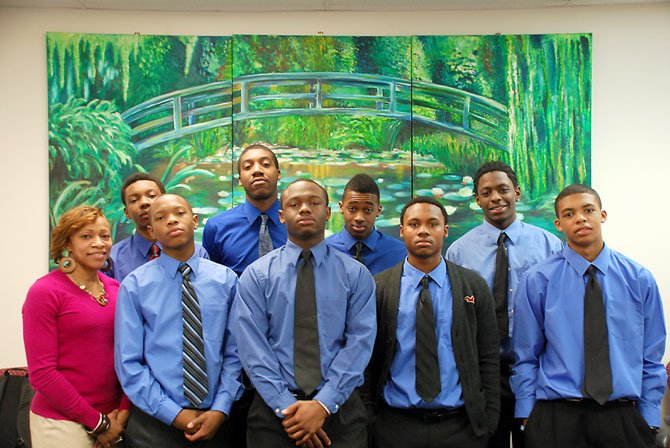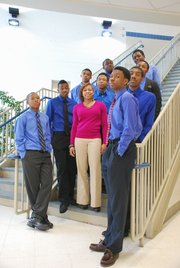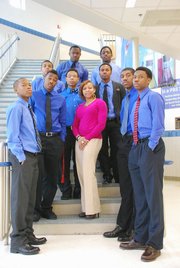Lee social worker Marcella Fulmore is joined by PAAMAS members (bottom, from left) seniors Thomas Watson, Ashwin Pitt, Demond Richeson, sophomore Darryl Gray, (top, from left) seniors Pearson Wheatley and David Johnson, junior Daniel Williams and sophomore Jonathan Walters. Photo by Tim Peterson
When she started college at Norfolk State University in Virginia, Marcella Fulmore was an engineering major. She loved the math, but impersonal labs and the prospect of a cold, money-driven career forced her to make a decision. When considering her transition, she remembered how in high school, people would come to her with their problems. “I just thought, ‘I could help people,’” Fulmore said. “That’s it.”
She chose to radically change her path and earned both a bachelors and masters degree in social work from NSU. Over a decade later, the sole Robert E. Lee High School social worker not only carries out that job description, but has also created a literacy program and hugely popular mentoring group called Powerful African American Males About Success (PAAMAS), for which she is being honored next month in Richmond with the Virginia Mentoring Partnership’s 2012 Outstanding Mentor Award.
FOR FULMORE and her students, PAAMAS is all about transitions: do you have the information, the encouragement from role models and the self-confidence to make smart plans and good decisions? For too many of her students, the answers were invariably “No.”
After joining the staff at both Lee and Springfield Estates Elementary School in 2003, Fulmore’s first two years were filled with underachieving students—students lacking structure and support at home, who were often limited only by their lack of direction. “We would talk about transitioning out of high school, some of their goals and plans,” she said. “A lot of times it was going to college, but they hadn’t prepared themselves to make that transition.”
In some cases, students had competitive GPAs, but simply didn’t apply anywhere. Or they expected to be snatched up to play sports at the collegiate level, yet they weren’t on a school sports team. Fulmore was confused that the pieces didn’t add up. “Most of the time I figured it was because they didn’t know how to plan.”
Then one Sunday in 2006, Fulmore read a story from the “Being a Black Man” series in The Washington Post. The protagonist was an African American man who was stranded on the side of the road, then wrongfully arrested in a case of mistaken identity. The story highlighted how highly populated Prince George’s County jail system was with African American males. The tale struck a nerve with Fulmore: “That day, I said: I have to do something more. The next day I came into school and started talking with different people about helping African American males, so that wouldn’t be them sitting in the PG jail because they failed to plan their transition appropriately.” With this specific population, Fulmore explained, “I saw the suspension rates were high, the academic rates were low and they had no transition plans.”
THE FIRST YEAR of the program, Fulmore worked with 17 young men—essentially an extracurricular class that meets during pseudo-study hall period “Lancer Time”—only from the high school level, focusing on building social skills, academic skills and leadership skills. But while PAAMAS was finding its feet, Fulmore saw another opportunity at Springfield Estates.
She connected with one African American student who had chronic discipline problems and discovered not only had his mother just recently been released from prison, but his father had been locked away since the boy was a baby. The student had bounced around from schools in Washington, D.C., and Prince George’s County before landing—insecure and rough around the edges—in Springfield. “I came back to the high school thinking: What can I do for kids at this level?” said Fulmore.
She hatched the idea of getting her PAAMAS students to mentor African American students at Springfield Estates. “They all said OK!” Fulmore enthused. “They were excited right away.” The original plan was to match PAAMAS members each up with a mentee, with weekly one-hour sessions devoted entirely to social skills: respect, listening, communication, etc.
The program later added an academic focus, and now alternates between that and its social component. As soon as Fulmore and her high school students cover a topic, the mentors turn around and discuss it with their younger counterparts, developing crucial leadership skills. “At first it’s strange, but as time goes, we connect,” said Ashwinn Pitt, a Lee senior and third-year member of PAAMAS. “You get on the same level with them.”
The operation, which currently includes 11 Lee mentors and nine Springfield Estates mentees, has expanded with school-week meetings bleeding into social excursions into the community on the weekends. Basketball games and ice skating, among other activities, allow the whole group to practice their skills in the open.
AS AN INDEPENDENT VENTURE, students receive no credit for the activity and funding must come from a variety of outside sources. The group holds its own car wash and bake sale fundraisers, but also receives donations of both money and volunteer time from organizations in the community including Alfred Street Baptist Church Discipleship Group 20 in Alexandria and Omega Psi Phi and Kappa Alpha Psi fraternities.
For Lee senior Thomas Watson, the whole opportunity couldn’t be more fulfilling. “It makes me feel good as a person,” he said, “to know that the kids look up to us, appreciate us as role models. Growing up, no one really talked to me like that, saying ‘You can do the right thing, there’s someone to look out for you.’”
Fellow senior Demond Richeson echoed the sentiment, adding the impact they can have on their mentees’ lives: “We’re getting to them before they start making bad decisions. We talk about how they view other African American males, that it’s not just about what’s negative on the news.”
The success of Fulmore’s work with PAAMAS is readily apparent. The group has a 100 percent retention rate from year to year (students may apply to join their sophomore year) and most students see their GPAs rise over the course of their membership. She enjoys seeing everyone grow and blossom, fulfilling her simple goal for them: “To have self confidence, that they can be leaders, that they’re born leaders. They can do many great things in this life if they just aren’t afraid to step out on a limb and try.”
And though Fulmore’s aim with PAAMAS, or any of her work at the high school or elementary school levels, was not recognition, she said she couldn’t be happier about the award. “It’s a wonderful, wonderful feeling,” she said. “And that’s what makes this bittersweet; I just want to help the students.” Regardless, she acknowledges her award is important on several levels.
“With all this press now, I think it’s wonderful for the school,” Fulmore said. “The media quickly picks up on the problems in the school system—low testing performance, this student brought a knife. ... The media doesn’t take time to look at positive programs going on. And for other African Americans to see [these students] not getting arrested, not hanging on the corner, they’re learning the gifts of giving back at a young age.”
And they’re learning how to help others plan their own transition.


